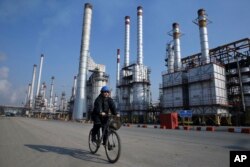A senior State Department official has told reporters the United States expects companies all over the world to cut their crude oil imports from Iran to zero by November 4 or face U.S. sanctions.
The State Department official said he had been meeting with European diplomats to convey the message that the Trump administration is serious about enforcing new sanctions on trade with Iran since President Donald Trump withdrew the U.S. from the Iran nuclear deal in May.
Asked about what kind of reaction he has been getting from European allies, who remain part of the Iran nuclear deal, the official said, "I am continually struck by the amount of business that is falling out of Iran. [French automaker] Peugeot and others simply view Iran as too risky a place to do business."
The State Department official said now is the time for the companies to stop buying Iranian oil.
"They should be reducing now. ... That is why we've offered this window since May 8, as sort of a drawdown period" ahead of the November 4 deadline, the official said.
The official said the move applies not only to Europe but also to India, China and Turkey, where he has not yet held talks with officials but will convey the same information to them.
Oil prices rose following the announcement. Iran is OPEC's third-largest oil producer, exporting 2 million barrels a day.
Britain, France, Germany and the European Union as a whole have strongly protested Trump's withdrawal from the Iran nuclear deal and vowed to protect their companies from what are called "secondary sanctions," which punish companies from other countries that engage in business with sanctioned sectors of the Iranian economy. The State Department official said that secondary sanctions against Iran are not new.
"On the diplomatic front, we have had secondary sanctions in place in Iran since 1996," the official said.
Asked about increasing street protests in Iran against higher prices and the plunging value of the currency, the State Department official said it seems there is a new protest "blowing up" every month.
"Iranians are basically fed up with the regime's squandering of the nation's wealth on not particularly productive or enriching ventures abroad," the official said.
Reports out of Tehran said vendors at Tehran's Grand Bazaar on Tuesday continued a rare strike that began a day earlier over the collapse of the rial on foreign exchange markets.
Meanwhile, Iranian President Hassan Rouhani addressed a meeting of judges and called for unity in the face of his country's economic woes.





